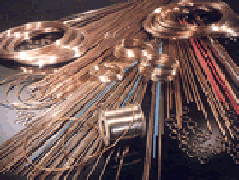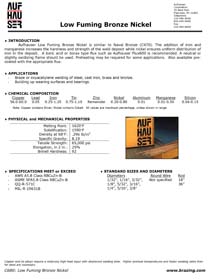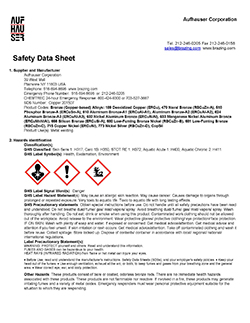C680 Low-Fuming Bronze Nickel
Nominal Chemical
Composition
INTRODUCTION
Aufhauser C680 Low-Fuming Bronze Nickel is similar to Naval Bronze (C470). The addition of iron and manganese increases the hardness and strength of the weld deposit, while nickel ensures uniform distribution of iron in the deposit. A boric acid or borax type flux such as Aufhauser Flux600 is recommended. A neutral or slightly oxidizing flame should be used. Preheating may be required for some applications. Also available pre-coated with the appropriate flux.
MAJOR ADVANTAGES
- Joints are made at lower temperature than in gas or arc welding
- Minimizes thermal stress and distortion
- Less susceptibility to cracking
- Soft and ductile weld deposits
- Easy machinability
- Low residual stress
- High strength fillets
- Mobile equipment for simple on-site repair
METALS TO BE BRAZE WELDED
- Steels, cast irons, copper alloys, nickel alloys and stainless steel
APPLICATIONS
- Braze or oxyacetylene welding of steel, cast iron, brass and bronze
- Building up wearing surfaces and bearings
GENERAL INFORMATION
Chemical Composition| Copper | Lead | Iron | Tin | Zinc | Nickel | Aluminum | Maganese | Silicon |
|---|---|---|---|---|---|---|---|---|
| 56.0-60.0 | 0.05 | 0.25-1.25 | 0.75-1.10 | Remainder | 0.20-0.80 | 0.01 | 0.01-0.50 | 0.04-0.15 |
Note: Copper contains Silver; Nickel contains Cobalt. All values are maximum percentage, unless shown in range.
PHYSICAL and MECHANICAL PROPERTIES
| Melting Point | 1620°F (882°C) |
| Solidification | 1590°F (866°C) |
| Density at 68°F | 0.296 lb/in³ |
| Specific Gravity | 8.19 |
| Tensile Strength | 65,000 psi |
| Elongation in 2" | 25% |
| Brinell Hardness | 92 |
SPECIFICATIONS MEET or EXCEED
| AWS A5.8 Class RBCuZn-B |
| ASME SFA5.8 Class RBCuZn-B |
| QQ-R-571C |
| MIL-R-19631B |
STANDARD SIZES AND DIAMETERS
| Diameters | Round Wire | Rod |
|---|---|---|
| 1/32", 1/16", 3/32", | Not specified | 18" |
| 1/8", 5/32", 3/16", | 36" | |
| 1/4", 5/16", 3/8" |
TYPICAL USES FOR ALLOY C680
| Product Category | Product | Reason Category | Reason |
|---|---|---|---|
| Industrial | Welding Rod for Cast Iron | Conductivity (Electrical) | Electrical Conductivity |
| Welding Rod for Cast Iron | Conductivity (Thermal) | Thermal Conductivity | |
| Welding Rod for Cast Iron | Corrosion Resistance | Oxidation Resistance |
ADDITIONAL INFORMATION
Copper and its alloys require a relatively high heat input with shortened welding time. Higher preheat temperatures and faster welding rates than for steel are necessary. |



